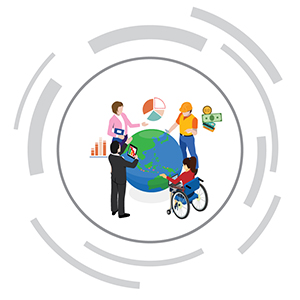
Indonesia’s industrial sector is currently experiencing slowing growth rates, and is also growing at a slower rate than the national economy. The slowdown of growth in secondary sectors such as industry will naturally coincide with increasing growth in tertiary (services) sectors. However, the growth of Indonesia’s services sector largely masks the fact that it offers low added value, is still informal, and does not have a high-talent workforce.
At the same time, the Covid-19 pandemic has affected the pace of economic transformation in Indonesia to the point that it now needs different strategies to respond to the myriad of challenges presented by the pandemic so that it could stabilize and/or grow further from its pre-COVID levels.
The industrial sector must remain the Indonesian economy’s main driving force because it offers massive opportunities in creating a productive workforce that enables the accumulation and spreading of knowledge and knowhow to workers and the public. Any industrialization strategies going forward must adapt itself towards the challenges and the opportunities presented by unconventional conditions such as the Covid-19 pandemic, to create a more effective economic transformation.
Key Terms
Reindustrialization, Technological Adaptation, Digitalization, Economic Transformation, Post Covid-19 Recovery, Sustainable Growth, High-Income Country, Job Creation, Productivity, Accumulation of Knowledge and Knowhow, Adaptation, Post Covid-19 Global Economic Dynamics
Key Topics
- The best industrialization and reindustrialization practices in various countries, including the effects of technological innovation, digitalization and shifting global supply networks.
- A gradual and effective economic transformation strategy
- Post Covid-19 economic recovery strategies and continued economic growth through industrialization.
- An aim to become a high-income country through industrialization.
- The capacity of industry in creating sustainable jobs and upholding sustainable environmental impact.
- Productivity as the main driver towards industrial growth and economic transformation.
- The accumulation of knowledge and knowhow as a key factor in becoming an advanced industrial nation.
- The uniqueness of Indonesia’s economy as a key factor in becoming an advanced industrial nation.
- The industry’s adaptation capacity in facing the global economy.

